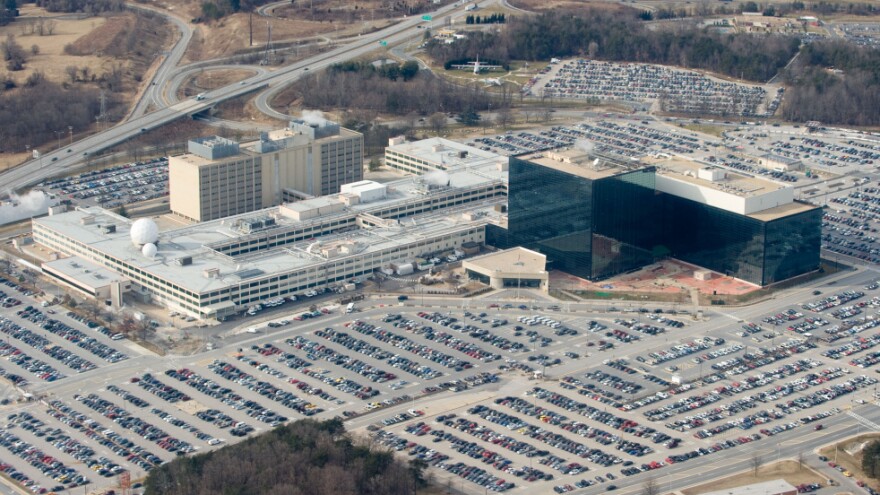The continuing leak of classified information by former NSA contractor Edward Snowden has renewed a debate about the U.S. government's power to reach secretly into the personal lives of its citizens.
But there is at least one point on which both privacy advocates and security experts agree: The laws governing electronic eavesdropping have not kept pace with technology.
In October 1975, Sen. Frank Church of Idaho began hearings on abuses in the intelligence community. His focus was a shadowy agency that was picking up the communications of Americans, including Vietnam War protestors and civil rights leaders.
The National Security Agency, Church said, was violating the law by listening in on Americans' phone calls. What came out of his hearings was new intelligence oversight committees in Congress and a secret court that would have to issue warrants for NSA to do its foreign intelligence work.
Peter Fenn, a Democratic strategist and head of Fenn Communications, worked on the committee. "Our concern at the time," he says, "was the potential for NSA to be one big, huge vacuum cleaner" — one that could snatch phone calls and telegrams that might be used to target political enemies or stifle dissent.

He and other NSA critics say the spy agency's growing power has made that analogy seem quaint.
"What we've seen since," Fenn says, "makes that vacuum cleaner look like a 1920s Hoover."
What the NSA can do now is much more sophisticated and far reaching than in the 1970s, back when it was grabbing paper copies of telegrams at Western Union or intercepting satellite communications with large microwave dishes.
James Bamford, who has written three books about the NSA, says the agency has been able to throw out a larger net by tapping into cables as thin as a human hair that move phone calls, e-mails and faxes.
"These were fiber optic cables. ... You're able to squeeze tens of thousands of communications into a single cable," he says.
NSA is able to connect with those cables by getting secret court orders issued to American phone companies. All that information will eventually reside at a massive, new NSA facility in Utah.
"The irony here is that the only living, breathing archive of every long-distance telephone call made by every American resides in the computer databases of the National Security Agency," says Matthew Aid, who wrote a book called The Secret Sentry: The Untold History of the National Security Agency.
It would have been technologically impossible for NSA to store and analyze all this information collected by the program back in the 1970s. Officials call it telephone metadata — it includes the phone number, the numbers dialed, the date and time of the calls and their duration.
But the program does not include names or content, and it was approved by that secret federal court created after the Church Committee hearings.
Robert Litt, general counsel for the Office of the Director of National Intelligence, talked about the program's importance at a recent Washington conference.
"We collect all the data because if want to find a needle in the haystack, you need to have the haystack, especially in the case of a terrorism-related emergency," Litt said.
If Americans are swept up in the net, he added, their information can be used only if there's evidence of a crime: "What we cannot do — and I'm repeating this — is go out and target the communications of Americans for collection without an individual court order."
But President George W. Bush's administration was able to do just that without a court order. In the days after the terrorist attacks of Sept. 11, 2001, the NSA collected data on e-mail traffic, including messages to and from Americans.
The leaked documents from Snowden show that back then, the spy agency complained that the secret federal court could not move fast enough. Spy agency officials also worried that suspected terrorists could quickly change phone numbers before the NSA was able to get a warrant.
Congress was told of the warrantless collection a few days after the activity started, and there were no court orders issued for the first two and a half years. Amendments to the Patriot Act later allowed this collection of such bulk data.
A number of lawmakers say there are enough safeguards to protect Americans' privacy. But Sen. Mark Udall, a Colorado Democrat, says there has to be open debate.
"Frankly, I think we ought to reopen the Patriot Act and put some limits on the amount of data that the National Security Administration is collecting," Udall says.
Like the data that include Americans' long-distance telephone records, the law allows the NSA to collect what is termed "business records." But can that term extend to credit card purchases, bank accounts or even medical records?
A group of 26 senators — from both parties — put that question in a letter last week to Director of National Intelligence James Clapper.
Fenn, the former Church Committee staffer, says more needs to be done. He says the law he helped write more than three decades ago is obsolete.
"You know, the word 'digital' wasn't even in our vocabulary. So what we have seen is an unbelievably outdated piece of legislation that has not kept up with the technology," he says.
So Fenn has a solution: create another Church Committee, one for the 21st century.
Copyright 2021 NPR. To see more, visit https://www.npr.org.







